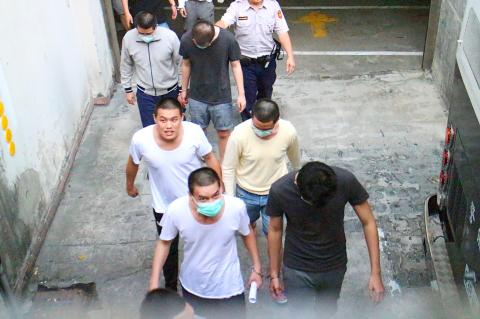The Shilin District Court yesterday convicted four Singaporean university students of sexual assault and handed down suspended sentences that would see them avoid prison time, but with conditions preventing them from leaving the nation until their probation expires.
The four were originally sentenced to jail terms of between 20 and 23 months, but the judges suspended the sentences and gave probation of four years for two of them and five years for the other two.
As it was the first ruling on the case, the defendants can appeal the court’s decision.

Photo: Huang chieh, Taipei Times
After a late night of revelry and drinking by the four in December last year, two Taiwanese women said they were raped by the group.
Lau Wei Seng (劉瑋城) was an exchange student at a university in Taipei, while the other three are friends who were reportedly enrolled at universities in Singapore.
The three friends were identified by Singaporean newspaper the Straits Times as Bryan Ong Kun Jun (王琨駿), Tan Juan Yin (陳俊穎) and Lim Wei Xuan (林煒軒).
All four were aged 23 at the time.
Lau testified that he invited the three from Singapore for a visit, with the group touring around the nation before ending the trip at a bed-and-breakfast in Taipei, where the alleged sexual assault took place.
The judges cited an agreement by the four men to pay financial compensation of an undisclosed amount to the two women as justification for the suspended sentences.
The two victims have agreed to the private settlement and reportedly said they were willing to forgive the four men and not pursue the case further, the court ruling said.
While the suspended sentences mean the four men do not have to serve time in prison, their probation requires them to remain in Taiwan until their terms expire, as the judges imposed protective control measures.
The measures require the four to regularly report their activities and whereabouts to probation officers, and any further infraction of the law would see the suspension lifted.
Lau reportedly met one of the women, known as “Siao Fang” (小芳), at a nightclub in Taipei on Dec. 11, and later invited her back to the group’s lodgings to party with his friends.
Siao Fang reportedly invited a friend to the party, drinking late into the night.
Afterward, the two women accused the men of forcing them to have sex while they were inebriated, despite their objections.
The defense said it was consensual sex between adults, quoting Siao Fang as saying that they could have sex with her, but “please don’t hurt my friend.”

PREPAREDNESS: Given the difficulty of importing ammunition during wartime, the Ministry of National Defense said it would prioritize ‘coproduction’ partnerships A newly formed unit of the Marine Corps tasked with land-based security operations has recently replaced its aging, domestically produced rifles with more advanced, US-made M4A1 rifles, a source said yesterday. The unnamed source familiar with the matter said the First Security Battalion of the Marine Corps’ Air Defense and Base Guard Group has replaced its older T65K2 rifles, which have been in service since the late 1980s, with the newly received M4A1s. The source did not say exactly when the upgrade took place or how many M4A1s were issued to the battalion. The confirmation came after Chinese-language media reported

The Taiwanese passport ranked 33rd in a global listing of passports by convenience this month, rising three places from last month’s ranking, but matching its position in January last year. The Henley Passport Index, an international ranking of passports by the number of designations its holder can travel to without a visa, showed that the Taiwan passport enables holders to travel to 139 countries and territories without a visa. Singapore’s passport was ranked the most powerful with visa-free access to 192 destinations out of 227, according to the index published on Tuesday by UK-based migration investment consultancy firm Henley and Partners. Japan’s and

A Ministry of Foreign Affairs official yesterday said that a delegation that visited China for an APEC meeting did not receive any kind of treatment that downgraded Taiwan’s sovereignty. Department of International Organizations Director-General Jonathan Sun (孫儉元) said that he and a group of ministry officials visited Shenzhen, China, to attend the APEC Informal Senior Officials’ Meeting last month. The trip went “smoothly and safely” for all Taiwanese delegates, as the Chinese side arranged the trip in accordance with long-standing practices, Sun said at the ministry’s weekly briefing. The Taiwanese group did not encounter any political suppression, he said. Sun made the remarks when

BROAD AGREEMENT: The two are nearing a trade deal to reduce Taiwan’s tariff to 15% and a commitment for TSMC to build five more fabs, a ‘New York Times’ report said Taiwan and the US have reached a broad consensus on a trade deal, the Executive Yuan’s Office of Trade Negotiations said yesterday, after a report said that Washington is set to reduce Taiwan’s tariff rate to 15 percent. The New York Times on Monday reported that the two nations are nearing a trade deal to reduce Taiwan’s tariff rate to 15 percent and commit Taiwan Semiconductor Manufacturing Co (TSMC, 台積電) to building at least five more facilities in the US. “The agreement, which has been under negotiation for months, is being legally scrubbed and could be announced this month,” the paper said,